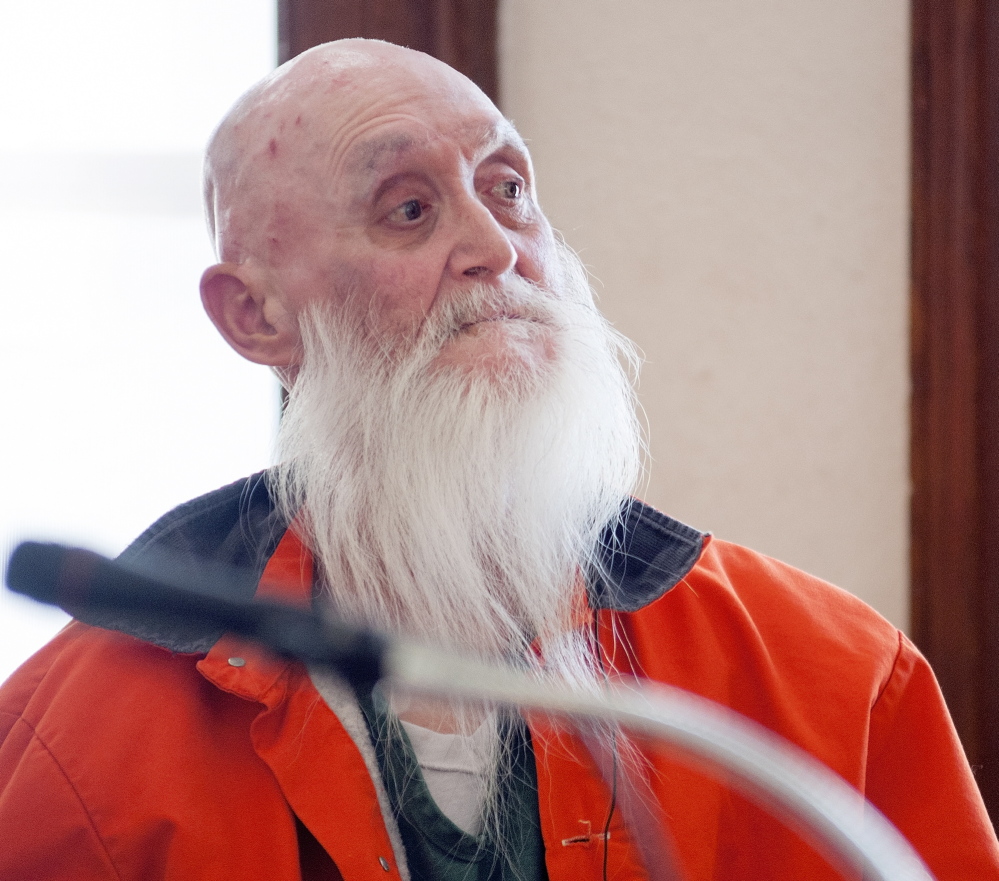AUGUSTA — Former Seattle transient Gary S. Raub has pleaded guilty to the 1976 killing of Blanche M. Kimball in her Augusta home and been sentenced to 20 years in prison.
Raub, 65, was charged in October 2012 with criminal homicide in the first degree, the equivalent to today’s murder charge. At the time, he was homeless and living on the streets in the university district of Seattle, Washington.
The charge followed an undercover sting in which Seattle detectives got Raub’s DNA by paying him $5 to participate in what they told him was a chewing gum survey.
He was later extradited to Maine to face the criminal homicide charge.
The charge against Raub originally said he “knowingly inflicted great physical suffering” while intending to kill Kimball, a 70-year-old retired dental technician and practical nurse who took in boarders.
In 1976, Raub, then Gary Wilson, lived in Kimball’s home at 352 State St. for a short time. He was questioned by police after Kimball’s body was discovered in early June 1976, but denied any involvement.
On Friday in Kennebec County Superior Court, Raub pleaded guilty to a lesser charge – criminal homicide in the second degree, which drops the phrasing that said he “knowingly inflicted great physical harm” – a statute in effect in 1976.
The plea was accepted by Justice Roland Cole and followed a settlement conference this week with another judge, Justice Thomas Humphrey.
Raub entered what is known as an Alford plea of guilty, which Deputy Attorney General William Stokes described as saying, “I’m not contesting everything you’re saying but I’m not agreeing with everything you’re saying, but I believe you can prove it.”
Stokes said the plea agreement was beneficial to both sides because it eliminated the risks of trial. Kevin Sullivan, one of Raub’s attorneys, agreed with that.
“This was a negotiated plea of 20 years as both sides had risk in this matter and a long trial,” Sullivan said via email Monday. “Mr. Raub lived in the home of Blanche Kimball as a boarder for a short amount of time. Mr. Raub’s DNA was found in the home and there was a good chance a jury would consider that enough to convict him. Due to an injury in the 1990s, Mr. Raub does not have any memory of this.”
Sullivan went on to say that Raub, who is not in good health, hopes to someday be released and didn’t want to risk a life sentence.
Stokes said the prosecution faced hurdles as well.
“When you’re dealing with a case that’s 38 years old, there are difficulties in gathering witnesses, finding witness recollections, the way evidence was handled, and the whole way cases were investigated 40 years ago is different from today,” Stokes said.
If Raub was convicted at trial of homicide in the first degree, he would have been ordered to serve a mandatory life sentence. The second-degree homicide conviction carries a minimum sentence of 20 years.
“It gives him the potential or hope that he can survive his prison time and have some time at the end of his life out (of prison),” Stokes said. “To get a murder conviction, get a minimum of 20 years, eliminates the risk of a life sentence. For all those reasons it really made sense to resolve the case.”
Stokes credited the prosecutors, Assistant Attorneys General Debra Cashman and Lara Nomani, for their work, as well as Maine State Police Detective Abbe A. Chabot. “The detective was persistent in tracking down leads and working with Seattle police to get DNA samples from Raub,” Stokes said.
Raub receives credit for the almost two years he has been held on the charge, and his sentence is subject to the good time provision in effect in 1976, meaning he is potentially eligible to have his sentence reduced by one-third.
Send questions/comments to the editors.




Success. Please wait for the page to reload. If the page does not reload within 5 seconds, please refresh the page.
Enter your email and password to access comments.
Hi, to comment on stories you must . This profile is in addition to your subscription and website login.
Already have a commenting profile? .
Invalid username/password.
Please check your email to confirm and complete your registration.
Only subscribers are eligible to post comments. Please subscribe or login first for digital access. Here’s why.
Use the form below to reset your password. When you've submitted your account email, we will send an email with a reset code.